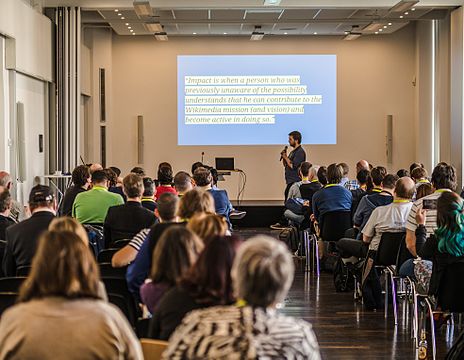Wikimedia Conference 2016/Program/11
11: Orientation Session for the Impact Track
[edit]How to move forward
[edit]-
Cornelius providing insights regarding the participants' view of impact
- What was this session about?
The session was mainly thought as an orientation session to understand why and how the Impact topic will be approached at the Wikimedia Conference.
- What are the next steps to be taken?
Generally, no next steps were intended to be taken in this session. However, it is intended to use a similar program design process for the Wikimedia Conference 2017.
- Who is the person to reach out to?
Regarding the program design process, Cornelius Kibelka is the right person to contact. Regarding the "Impact" topic, please reach out to Nikki Zeuner.
- Photos
- Slides

- Original Description
- This session will present the summary of the participants’ survey results on impact related questions and show how this input helped shape the conference program. It will introduce the terminology around impact to ensure that everybody will be able to follow the conversations at the Wikimedia Conference. It will also prepare participants for what they can expect and what is expected from them in the following sessions of the impact track.
- Desired Outcome
- Common understanding/use of the same terminology of impact; understanding of the ways and reasonings we talk about impact at the Wikimedia Conference
- Session Format
- Listening
- Speaker(s)
- Cornelius Kibelka (WMDE)
- Summary of the session
Cornelius Kibelka, the Program and Engagement Coordinator for the Wikimedia Conference, opened the session which meant to serve as an orientation session for the Impact track of the Wikimedia Conference.
First, Cornelius gave an introduction and explanation on the refurbished program design process of the conference. Instead of a program committee (like for the last conferences), the program was designed based on a survey. The survey (11 questions) was part of the registration form, he explained. Volunteer program advisers supported the process on specific issues. The survey asked for needs, wishes, and experiences of all Wikimedia Conference participants. The result was a program with three different tracks: How to Move Forward Track, Impact Track and the Capacity Building and Learning Track.
After explaining the program process, Cornelius thanked all participants for filling out the long survey. He then gave an insight on what participants thought of Impact. He chose some of the eleven questions and showed slides visualizing the answers. He came up with three different statements.
He stated that among the participants was a huge passion for free knowledge. Most participants described their current understanding of impact as fighting free knowledge and having an impact (as in: changing) the societies they’re living in. Secondly, he stated that while individuals had a huge passion for free knowledge, the organizations and groups were focussing more on Improving / increasing / satisfying communities and improving the content of the Wikimedia projects. That means, he stated, that the organization were much more Wikipedia-focussed (instead of generally Free Knowledge-focused) than expected. Cornelius then digged in more into what organizations saw as their main challenges for the next years. Most organizations were focussed on increasing their outreach, increasing their amount of members, and increasing the number of editors and readers. Some were focused on improving their local structures. Finally, he explained what barriers organizations were facing to achieve the aforementioned challenges. Most of it were common barriers and obstacles such as lack of resources (money, people), but also other reasons like societies, governments, and internal governance issues. Most of the participants stated that their volunteers and local partners help to overcome these challenges.

Cornelius gave his conclusion: It was obvious, he stated, that the range of participants was increasingly diverse, many people had really different experiences and needs. Many different organizations and groups were present at this conference, he gave the example of Wikimedia Deutschland (the oldest, biggest) and some user groups, which were recently created. He explained what a challenge it was to design a program for such a diverse audience. Cornelius also stated that many had a different understanding of what impact meant to them.
Finally, Cornelius gave an overview which sessions the impact track contained.
- 12: Impact Working Session: A working session of around fours hours, led by Nikki Zeuner and Christof Pins to deeply dig in what different understandings of what impact the movement has and what conclusions this had for the Wikimedia movement.
- 16: Capturing Social Change Through Outcome Mapping: A session by Jaime Anstee and Sati Houston working with a specific technique called “Outcome Mapping” to see what different kinds of outcome we had in the movement.
- 31: Create your own metrics: examples from Wikimedia France and Wikimedia UK: A session by Daria Cybulska and Mathieu explaining how their organizations learned to develop their own measures of success beyond the traditional Global Metrics.
- 15: Global Metrics Retrospective and Revision: A second session led by Jaime Anstee and Sati Houston working and revising the Global Metrics and discussing what next steps could be and how the Global Metrics could be improved.
Then, Cornelius closed the session.

